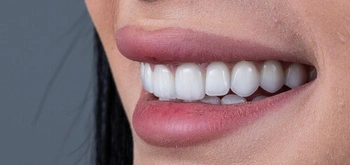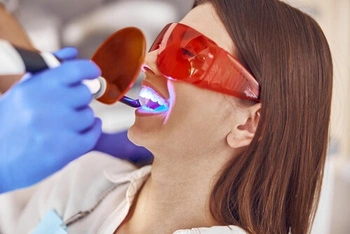A bright smile can raise your confidence and make a great first impression. But if you have dental veneers, you might wonder whether teeth whitening is still an option. This is a common concern for anyone with porcelain veneers or composite veneers who notices their teeth looking less vibrant over time. While veneers are a popular cosmetic dentistry solution for creating a natural-looking, uniform smile, they behave differently from natural teeth when it comes to whitening.
In this guide, we’ll explain everything you need to know about teeth whitening on veneers, including how whitening treatments work, what you can and can’t do, and how to maintain a bright and healthy smile in the long run.
Can You Whiten Veneers Like Natural Teeth?
 The short answer is no. Veneers are fabricated from materials like porcelain or composite resin, which are designed to be stain-resistant and durable. Unlike natural enamel, they don’t respond to teeth whitening gels or treatments. This means that while whitening can brighten your natural teeth, it won’t change the colour of existing veneers.
The short answer is no. Veneers are fabricated from materials like porcelain or composite resin, which are designed to be stain-resistant and durable. Unlike natural enamel, they don’t respond to teeth whitening gels or treatments. This means that while whitening can brighten your natural teeth, it won’t change the colour of existing veneers.
However, this doesn’t mean you’re stuck with discoloured veneers forever. There are still effective ways to refresh your smile and improve the appearance of your veneers.
Why Veneers Don’t Respond to Whitening
Understanding the material your veneers are made from can help explain why traditional teeth whitening treatments don’t work on them.
Porcelain veneers
These thin shells are made from a non-porous ceramic material. They’re highly resistant to coffee, tea, red wine, and tobacco stains. Because they don’t absorb stains in the same way enamel does, whitening agents can’t penetrate their surface.
Composite veneers
Composite veneers are typically made from a resin material similar to what’s used in dental fillings. They are more porous than porcelain, which means they can stain over time. However, they still won’t respond well to whitening treatments designed for natural teeth.
What Causes Veneer Discolouration?
While veneers themselves don’t stain deeply, the surrounding areas and the natural teeth next to them can change colour. Here are some common reasons you might notice a difference in shade:
- Surface staining: Drinks like coffee, tea, and red wine, as well as smoking, can lead to stains on the veneer surface over time.
- Ageing natural teeth: Even if your veneers remain bright, your natural teeth may darken with age, causing a mismatch.
- Wear and tear: Over time, small scratches or surface changes can make veneers more prone to discolouration.
- Poor dental hygiene: Skipping regular brushing and professional cleaning can result in plaque build-up, affecting your smile’s overall appearance.
Ways to Refresh and Brighten Veneers
What are your options if traditional whitening treatments won’t work on veneers? Fortunately, several effective solutions depend on the cause of the discolouration.
Professional cleaning
If the discolouration is on the surface, a professional cleaning at your dental clinic might be all you need. A dentist can polish the veneers to remove surface stains and restore their original brightness. This is often enough to refresh their appearance and maintain a whiter smile.
Polishing composite veneers
If you have composite resin veneers, your dentist can often polish and smooth the surface to remove superficial stains. This simple procedure can make a significant difference without needing to replace them.
Replacing old veneers
If the veneers are old, damaged, or significantly discoloured, replacing them might be the most reliable way to achieve a whiter and more consistent smile. Modern porcelain and composite materials are more resistant to staining and are designed to match your desired look.
Whitening natural teeth first
If you’re planning on getting new veneers, your dentist might recommend whitening your natural teeth before the procedure. This ensures the veneers can be matched to a brighter shade from the start.
At-Home Care Tips to Keep Veneers Bright
While veneers are stain-resistant, they’re not completely stain-proof. How you care for them day to day can make a big difference in how they look over time. Here are some practical tips to maintain their appearance:
- Brush and floss regularly: Proper dental hygiene prevents plaque build-up and keeps your veneers and natural teeth looking their finest.
- Rinse after consuming staining foods or drinks: Swishing water after coffee, tea, or red wine can help prevent stains from settling.
- Limit tobacco use: Smoking can stain both veneers and natural teeth and affect your overall dental health.
- Use a soft-bristled toothbrush: This helps prevent scratching the veneer surface, which could make them more susceptible to discolouration.
- Visit your dentist regularly: Routine check-ups and professional cleaning will help you maintain a bright, healthy smile and address any issues early.
Temporary Veneers and Whitening
If you’re wearing temporary veneers before your permanent ones are fitted, you might notice they stain more easily. Temporary veneers are usually made from a different material that isn’t as stain-resistant. Whitening them isn’t necessary because they’re only meant to be worn for a short period. Instead, focus on gentle cleaning and avoid highly staining foods and drinks until your final veneers are placed.
 Should You Try Whitening Treatments Anyway?
Should You Try Whitening Treatments Anyway?
Some people attempt at-home whitening treatments, hoping they’ll work on veneers. However, whitening gels, strips, or trays won’t change the colour of porcelain or composite materials. They might brighten your surrounding natural teeth, which could make the veneers appear darker by contrast. If you notice this happening, speak with your dentist about adjusting the shade of your veneers or whitening the rest of your teeth for a more uniform appearance.
When to See a Dentist About Veneer Colour
If you’re unhappy with how your veneers look or notice a significant change in colour, book a consultation with your dentist. They can examine the veneers, assess the condition of your natural teeth, and recommend the most effective solution. In some cases, a simple polishing or professional cleaning might restore their appearance. In others, replacing them may be the most effective way to achieve a consistent shade and maintain your smile’s brightness.
Final Thoughts: Achieving a Long-Lasting Bright Smile
Teeth whitening on veneers works differently than on natural teeth, but that doesn’t mean you can’t maintain a bright, confident smile. While whitening treatments won’t lighten the colour of porcelain or composite veneers, there are effective alternatives, from professional cleaning to replacing older veneers entirely. The key is regular brushing, good dental hygiene, and routine check-ups to ensure your veneers continue to look bright.
If you’re considering whitening or refreshing your veneers, the most reliable first step is a consultation with your dentist. With their guidance, you can choose the right approach to achieve your desired appearance and enjoy a bright, healthy smile for years to come. Contact Beyond 32 Dental today at (02) 9158 6334 and let our experienced team help you refresh and maintain your veneers.
References:
NHS. (n.d.). Teeth whitening. Retrieved from https://www.nhs.uk/tests-and-treatments/teeth-whitening/
Cleveland Clinic. (n.d.). Dental veneers. Retrieved from https://my.clevelandclinic.org/health/treatments/23522-dental-veneers
Healthline. (n.d.). Foods that stain teeth. Retrieved from https://www.healthline.com/health/foods-that-stain-teeth


 Should You Try Whitening Treatments Anyway?
Should You Try Whitening Treatments Anyway?



Recent Comments